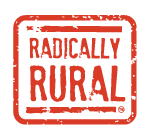Day 2: July 9, 2024
It was a very full day! I’ll focus on two initiatives for now and will circle back (no pun intended) in the future to unpack more.
Model 1: Double Mountain Brewery – Refillable, returnable bottling as a way to launch circular economy in a rural region
This story and the attached models and concepts are extensive enough that I’d lose all of you in the length of it, so I’ll get it started today and continue it in stages.
If you read our newsletter leading up to this trip, you know that the reason that this rural region has been on our radar since 2021 is because our very first Radically Rural Roundtable featured Matt Swihart, founder and owner of Double Mountain Brewery, a brewery in Hood River that had made the bold decision to use returnable, refillable bottles to sell their beer. Our grandparents might laugh at this concept being seen as innovative, given that it was the only option up until the 1930s when disposable steel cans were introduced, after which refillable glass continued to decline in popularity and use. However, in today’s world, it truly is bold and innovative to reinvent these systems.
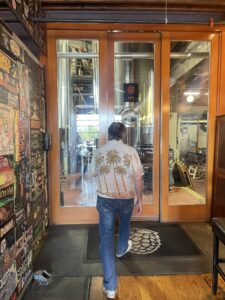 In fact, while we were sitting and chatting in the brewery, Matt and I bonded over the fact that both of us have lived in Rwanda (him for the Peace Corps, leaving only six months before the genocide, and me to teach English, nearly twenty years after the genocide) and both noticed how vital the returnable, refillable bottling practice was there. If a developing country can do it, why can’t we? He recalled how precious the bottles were to the shop owners there, even more than what was inside. Once when he and another Peace Corps buddy stationed in Burundi were going to take a motorcycle ride out to the countryside, they purchased some beer and were going to throw the bottles in their backpacks to take with them. The store owner was appalled and told them that they couldn’t leave the store with the bottles. Matt ended up offering them a deal, leaving his watch as collateral in proof that they would, in fact, return the bottles.
In fact, while we were sitting and chatting in the brewery, Matt and I bonded over the fact that both of us have lived in Rwanda (him for the Peace Corps, leaving only six months before the genocide, and me to teach English, nearly twenty years after the genocide) and both noticed how vital the returnable, refillable bottling practice was there. If a developing country can do it, why can’t we? He recalled how precious the bottles were to the shop owners there, even more than what was inside. Once when he and another Peace Corps buddy stationed in Burundi were going to take a motorcycle ride out to the countryside, they purchased some beer and were going to throw the bottles in their backpacks to take with them. The store owner was appalled and told them that they couldn’t leave the store with the bottles. Matt ended up offering them a deal, leaving his watch as collateral in proof that they would, in fact, return the bottles.
After leaving the Peace Corps, Matt worked at a home brewing supply store and learned about his love of brewing. He ended up going to beer school (yes, it’s a thing) in Chicago, and moved to Hood River right after that to work in another brewery. After 14 years with that brewery, he decided to start his own. Someone naturally conscious about the environment, he originally wanted to start
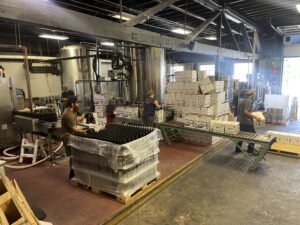
the business using refillable, returnable bottles. He quickly discovered the challenges of doing that when the infrastructure was all but non-existent.
To be continued…
While Matt’s story and accompanying lessons will be concluded later on, I will conclude by saying the whole experience being there at the brewery was beautifully rural. While in the restaurant, he greeted many folks by name. As we were chatting in the warehouse where the bottles were being refilled, someone hopped off an electric scooter with a box of refillable, returnable bottles and dropped them in the bin. He and Matt waved and smiled at each other– “That’s one of our local coffee shop owners,” Matt said.
Model 2: The Fruit Loop – A self-guided tour of 30 of Hood River’s fruit stands, orchards, cideries, and wineries as a way to support local farmers
One thing is clear as you drive around Hood River. While at first glance, it feels pretty geared toward the outdoor enthusiasts who visit and/or live seasonally, once you leave the downtown area it is obvious that the lifeblood of the community and the entrepreneurs who live here is farming.
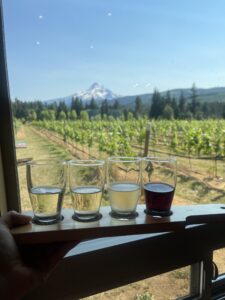
We couldn’t believe how extensive the orchards, berry fields, and flower fields were. We saw luscious cherries, apples, pears, berries, and more. According to the Fruit Loop website, “…The Hood River Valley has a rich agricultural heritage, beginning with the planting of the first fruit trees in 1855, resulting in 14,500 acres of pears, apples, and cherries that cover the valley today.”
We loved this model as a clear and successful way to get visiting folks out to the farms to support the farmers. It worked for us, as you can see in this picture of the truly breathtaking view of Mount Hood, taken while wandering through “Grateful Vineyard.” We stayed and tasted four kinds of wine, two of which were made exclusively from the grapes and fruit they had grown.
Unfortunately, all of the other small farms we stopped at were closed, understandably due to the extreme heat. At one point I looked at the thermometer and it was 112 degrees.
What about you, does your town do any kind of self guided tour to drive business to the arts, farms, or anything else?
Wild Spaces
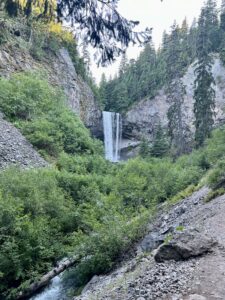
Part of knowing a rural region is inevitably knowing its land, waterways, and other natural assets. Every day we’ve been experiencing at least one beautiful place, and yesterday I was in the presence of the most powerful natural force of my life. As we hiked to Tamanawas Falls, we were stunned by the unique mosses and other features of the trees, so different from ours back east. The river, made from glacier runoff from Mount Hood, was a color that I’ve never seen before. It was fresh and cool. When we saw the waterfall from a distance it took our breath away. The closer we got, the more intense that feeling became. I don’t have a picture from up close because the force was so intense that even getting within reach of the spray made it feel like we would be blown off the rocks. I had hiked barefoot, but I set my bag down and climbed as close as I could (which by the way, wasn’t all that close). As I stood there, arms stretched wide and eyes closed, I was pelted by the water and accompanying force, thinking about the stories and memories contained in the rocks, water, and trees that have transcended the timeline of humans. What it means to be rural has changed so much over time, and I want to learn as much as I can, even from the nonhuman life forces on this earth.
Tidbits:
- Matt Swihart said that when he moved here 30 years ago in 1994, the way he got to know the community was by visiting the library to read the local newspaper archive as far back as they had it up to the current date. First of all, mad props for the commitment to get to know a community, and second of all, BRILLIANT. Our local newspaper, the Keene Sentinel, also has an easily accessible and navigable online archive of their print editions. Last year at our “CONNECT” event during the summit (where our theme was all about reimagining communication), we had a computer set up with instructions so that folks could navigate the archive to find out what was going on in our area on any given date. Matt said that he really got to know the good, the bad, and the ugly of the area that way. This shows yet again how vital local journalism is.
- Speaking of journalism, one of the ways I’ve been able to dig up information on cool organizations and efforts in this region is thanks to Columbia Community Connection News. Their tagline is “Honest, local news for the mid Columbia region.” Thank goodness for local news!
What’s next?
- Tomorrow we’ll meet with Michelle Martin and Alicia Flory with The Ford Family Foundation (TFFF)! TFFF staff have attended Radically Rural before and both of them are signed up for this year. Radical Circularity: From the Fruit Loop to the EconomyWe are excited to get to know them on their own stomping grounds. Among many other things, we are looking forward to hearing about their “Oregon by the Numbers” project and how that is contributing to measuring and increasing community well-being.
- We’re going to visit the library, a place we know is always at the heart of a community.
- We’re going to visit a new Immigrant Help Center (IHC) opened up by the Hood River Latino Network and the Rural Organizing Project. The IHC acts as a community hub and wrap-around service center. Programming includes cultural events, leadership skills development, and assistance navigating mental and health services.
- We’ve been finding ways to appreciate the beauty and natural assets of the region every day, and hopefully tomorrow we’ll find a way to get on the water!
Written by RR Director, Julianna Dodson.
